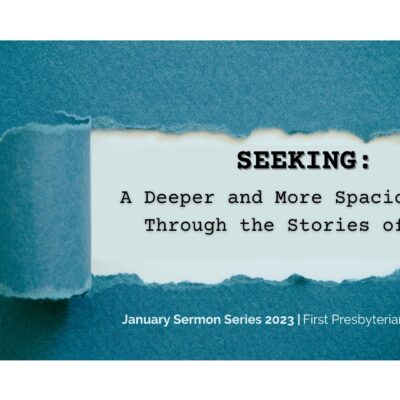Jan 29th, More Than Just Good Ideas – Parable of the Talents, with Becca Ellis
A Part of the Series:
Becca Ellis
Other Articles in:
Jan 29th: More Than Just Good Ideas – Parable of the Talents, with Becca Ellis.
We’re in the midst of our series, seeking a deeper and more spacious earth through the stories of Jesus. And each week we’re digging into some of these parables, these stories that Jesus told Hold, where we’re getting curious and asking ourselves what he might be pointing to about God, our faith, and what it has to do with living out our lives here, now, today. But parables can be tricky. Even the original listener is not always so sure of what point Jesus was trying to make, because sometimes we have to come back and back to parables. It seems sometimes we enter in a way when it seems obvious and easy, and then other times there is a little bit more struggle involved, right?
There’s some fences to hop, there’s some mystery, there’s some questions that are unanswered. But I think maybe this is the process that we’re invited into, right? Jesus didn’t seem to be as interested in just handing out answers to his listeners. He wanted them to struggle a little bit and ask questions about the how and why and what they were doing with their lives every day. Parables fascinate me when I think about the original audience Jesus was speaking to.
These were Jews living in a Roman occupied kingdom where they lived in between this tension of obligation to God and to the state, which were often in opposition to one another. And then Jesus comes along and he begins to point out all the ways that even the religious law seems to be missing the point. So he would tell these parables, often telling strange, outrageous, and sometimes disturbing stories, to try and invite his listeners into discovering something I think they might have already known, to lead them into learning something about this different way of living, to not get the kingdoms of earth so mixed up with the way the kingdom of God operated. Right? This way of living that promoted neighbor care and worked toward a world where everyone had what they needed to thrive.
Today we’re going to get into a story that I’ve personally always had a little bit of trouble with the parable of the talents. And part of the trouble with the story is that while it appears to be about this idea of stewardship and faithful risk taking and gaining trust, as well as this idea of accountability for how we use our resources and gifts, it also seems to promote a master who is ruthless, hard hearted, greedy and unjust. So it makes me wonder if there’s maybe something more to the story, right? And this is the invitation I think we find when things are unsettling, to get curious, ask questions, see what’s left to be found. So if you are looking for answers this morning, full disclosure, I don’t have many, but I do have plenty of questions to offer.
So we’re going to go through this story together and as we go, we’ll have some space to stop and dig into the context of when this story took place, because as a scholar and professor of Jewish studies, Amy Jill Levin says, if we get the context wrong, we’ll get Jesus wrong also. This adds some layers, some depth of understanding, I think, to what Jesus could be getting at, and it helps us enter the story a different way. So we’ll begin in Matthew 25, verse 14, where Jesus begins to tell this story. He says for it is as if a man going on a journey summoned his slaves and entrusted his property to them. To one, he gave five talents to another two to another one to each according to his ability.
Then he went away. Let’s stop here for just a moment and talk about the value of property the master entrusted to each servant. So a talent at this time was the largest measurement of monetary value in the ancient Middle Eastern world, and it was a huge sum. Scholars estimated to be around 6000 dinari, which was a day laborer’s wages for 20 years, right? The closest or lowest estimate for the current value of a talent in US.
Currency is over half a million dollars. So the listeners, the original listeners to the story, when they heard this, they would have known two things right off the bat. That one, the master is exceedingly wealthy, and two, the servants who could often be promoted to manage a master’s household and property were given a very large amount of money to tend to while the master is away. Okay, let’s keep going at once. The one who received the five talents went off and traded with them and made five more talents.
In the same way, the one who had the two talents made two more talents. But the one who had received the one talent went off and dug a hole in the ground and hid his master’s money. After a long time, the master of those slaves came and settled accounts with them. Then the one who had received the five talents came forward, bringing five more talents, saying, Master, you handed over to me five talents. See, I have made five more talents.
His master said to him, well done, good and trustworthy slave, you have been, trustworthy in a few things, I will put you in charge of many things, enter into the joy of your master. And the one with the two talents also came forward, saying, master, you handed over to me two talents. See, I have made two more talents. His master said to him, well done, good and trustworthy slave, you have been, trustworthy in a few things, I will put you in charge of many things, enter into the joy of your master. Then the one who had received the one talent also came forward, saying, master, I knew that you were a harsh man, reaping where you did not sow, and gathering where you did not scatter.
So I was afraid and I went and hid your talent in the ground. Here you have what is yours. All right, I’m going to stop there for now. But spoiler alert the master is not pleased with the third servant’s decision to simply bury the talent in the ground. So at first glance, the story seems to maybe be about making proper investments and calculated risks, especially from our modern Westernized point of view.
We might agree that the first two servants were faithful and congratulate their success. However, as we’ll learn to the audience Jesus was speaking to, it’s possible that this story was actually addressing exploitation, the third servant being the only one who actually acted honorably and took the greatest risk of all to stand up against corruption and injustice. So let’s talk more about why they might have this perspective. In the Torah. The Jewish law.
In the first five books we find in the Hebrew Bible, we see laws in place about exploitation, right? To protect the most vulnerable. There are laws that would state you are not to charge interest if you lent someone money that you expected to offer generous neighbor care for those who could no longer sustain a living for themselves. So for those listening to Jesus as he told this story, the amount of returns the servants made on their investments would have been deplored, because these returns could only have happened through extortion and fraud and lending money at illegal interest rates. Now, another part of this is that a master who seemed to own a considerable amount of land, he must have had people who were working the land, right?
So commonly, landowners would give loans to commoners or peasants based on the forecast of future crops. But if leaner years or poor crops came, the peasants would be unable to pay back the landowner. So he would then hire them back as day laborers to work off their debt through manual labor, and he would continue to profit off of them as they tended to as cash crops. So when the third servant says to the master, master, I knew that you were a harsh man, reaping where you did not sow and gathering where you did not scatter. He is essentially pointing out the fact that none of the wealth the master has obtained would be possible without a corrupt system in place where he could dispossess working people and make gains off their loss.
And in essence, the third servant, who is often described in the way people interpret the story as the least faithful or the laziest of the crew, right? He has perhaps actually been the bravest and boldest, a truthteller and social activist who knew there was great risk involved in his actions. What if the servant buried this money in order to take it out of circulation, right? So that it could not be used any longer to exploit and dispossess these poor working families? What if he was willing to not only look lazy and foolish to others, but also take the suffering others might experience upon himself, right?
Perhaps being even a closer representation of Jesus than the Master in the story, as is commonly interpreted. And as we read on, we see the Master’s response to the third servants. He says, you wicked and lazy slave, you knew, did you, that I reap where I did not sow and gather where I did not scatter? Then you ought to have invested my money with the bankers, and on my return I would have received what was my own with interest. So take the talent from him and give it to the one with the ten talents, for to all those who have more will be given, and they will have an abundance.
But from those who have nothing, even what they have will be taken away. As for this worthless slave, throw them into the outer darkness, where there will be weeping and gnashing of teeth. You have probably heard this line before about he who is entrusted with a little will be given more, something that feels common or true in our lives when it comes to gaining trust and adding more responsibility, right? But how does that feel when we think about this in the context of someone who is doing harm to others in order to make a profit? And does it line up with what Jesus says in other places, about the least actually being burst in the kingdom of heaven?
Right. Could this really be a representation of the image of God that inspires us toward a spacious way of living, to a wide and expansive love and way of being in the world? One that stands with the vulnerable and marginalized, that defiantly opposes being complicit in a system of oppression and exploitation? One that trades inconvenience for conscious action that makes a difference? Or could the story actually be a commentary on the state of the world, right?
Where the gap between those with nothing and those with wealth gets wider and wider, those who have more will be given more in abundance, and those who have nothing will even lose what they have. Now, it can get pretty overwhelming when we look at the social justice issues that we face today, right? There’s food insecurity, the refugee crisis, racism, climate change, income inequality, the list goes on and on and on, right? It can make you feel absolutely helpless. And I find it interesting.
Even the third servant, he says, I was afraid. It doesn’t say what he was afraid of. Was he afraid of what would happen to those who might be harmed if he used the money in a way the Master approved of? Was he scared of the punishment that would befall him one day? Or what if his actions, right, burying the money didn’t even make a difference in the grand scheme of things?
Jesus doesn’t offer us a roadmap for how to fix any of these problems, but these aren’t new problems, even if it’s a slightly different context. But what Jesus does do is he invites us into paying attention to those for whom the systems of the world are not working toward their benefits, right? The ones whose stories aren’t being told or just being blatantly ignored, to touch, to challenge the allure of moving up and working toward our own gain, only to see others continually suffer. What we find is that justice was actually at the core of Jesus spirituality. And when we, like the third servant in the story, are brave and bold and name exploitation and injustice when we see it, this is when we can dream bigger and reimagine the world.
But let’s talk about the type of justice that Jesus was promoting, though, because the Hebrew understanding of justice had a restorative undertone to it, right? A way to move toward equity. The Hebrew word we translate to justice is mishpot. We see it in texts like Micah Six Eight, where we read, and what does the Lord require of you? To act justly and to love mercy and to walk humbly with our God more justly is really this understanding of treating others with equity, restoring the world to the way God intended it to be, right?
One where everyone has the ability to thrive. There’s also this old beautiful Jewish law that offered a rhythm of reconciliation and rest, a resetting, if you will, every seven years. The Jewish community, they were to celebrate a sabbatical year, a year of full rest. The land was not to be worked. Any food that grew was to be given away for free.
And during this year, all deaths would be forgiven. There’s no evidence that this will ever really happen because what a huge cost to those who have more. But it reminds me of how in 2020, when the world was on lockdown, remember, we thought for just like a few weeks and these images started going around, these viral images showing the difference. Even that much time of less human activity cleared up waterways and air pollution in some places around the world. Of course, we can’t just live in perpetual lockdown forever.
We know that. But it gives me hope. Hope that we can make small differences that add up to something and a reminder that these aren’t just good ideas, but we have a deep calling within our faith tradition to be justice oriented, to offer generous neighbor and earth care. And it’s not always so simple, because how do we take what we are afraid of, these big things like climate change, the future for the next generation, violence inequity, discrimination and so on and use them as a catalyst for hope? How can we be reminded that justice restorative?
Justice, which works toward true equity in the world, is at the core of our spirituality and just as important as tending to some of those quieter practices that might appear more spiritual on the surface. Right? What if we thought of activism as spiritual practice, parenting as spiritual practice and a form of activism? I would argue and giving of your gifts and resources in brave ways that challenge corruption and exploitation as spiritual practice. Generous neighbor care as spiritual practice.
Stewarding the earth and choosing conscious action over convenience as spiritual practice.
Jesus invites us into a different economy, one that looks vastly different from the way our society operates, one that says everyone should be taken care of just as well as anyone else. And we do this by action infused with love for each other and this planet are shared home. I met someone recently who shared his experience of suffering a traumatic brain injury. He blacked out and was put into a medically induced coma for about a week. And he shared his experience of essentially dying.
He said his consciousness didn’t go away. He just kind of felt this floating sensation and the void of pain, something of what peace might feel like. And he said that even when he woke up, even though it had only been a week, right? It felt like he had been somewhere for hundreds and hundreds of years, this liminal space. But the thing he said that has stuck with me.
He said dying is easy. I just felt sick for a moment, and then peace. But waking up again to life, staying alive. I’m grateful to be here and essentially for a second chance at life. But that was the hard part.
Dying is easy. We’ve found all sorts of ways to numb ourselves to our own pain and the pain of those around us. But what does it mean to live like we are still alive? I wonder if maybe it has something to do with what this third servant stood for. All right?
And like the third servant, we might feel afraid and uncertain, and that’s okay. But we can also be brave together. We we can also live out this radical and spacious faith that Jesus has called us to as we stay awake to the brokenness in our world, the suffering of those around us, as we take care of ourselves and our neighbors, as we continue to work toward the flourishing of all. Peace to your friends.



